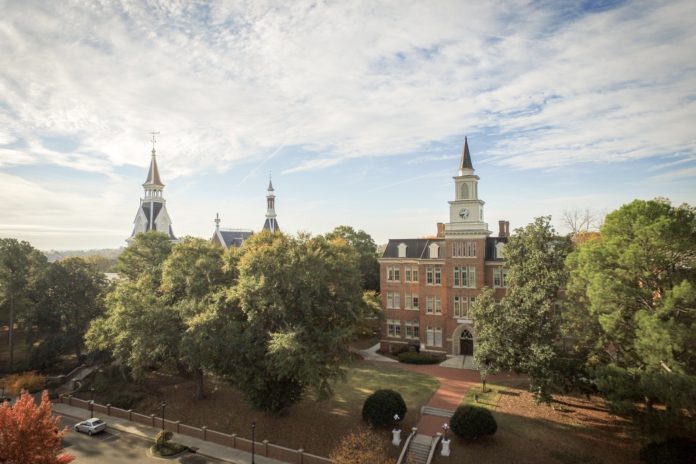(The following article was published Sept. 18, 2007 in The Telegraph, Macon.)
By Jennifer Burk – The Macon Telegraph
Amy Schwartz Moretti gives a violin lesson to Mercer University freshman Conrad Thomas on Thursday. Moretti was the concertmaster of the Oregon Symphony in Portland before coming to Macon to direct the Robert McDuffie Center for Strings at Mercer University.
Amy Schwartz Moretti listens intently as her violin student plays, his notes punctuating the air.
“A little faster,” she says. “Use more bow – yes!”
Occasionally she picks up her violin to demonstrate a technique. She gently corrects, uses constructive criticism and praises parts done well.
It was only a year ago that Moretti was plucked from her position as concertmaster of the Oregon Symphony in Portland to direct the fledgling Robert McDuffie Center for Strings at Mercer University.
This fall, the center enrolled its first official class of students, marking the beginning of what its founder and namesake, internationally renowned violinist Robert McDuffie, hopes will become a prestigious music conservatory with a focus on a university education.
Seven professional musicians handpicked by McDuffie teach the inaugural class of eight students selected through an application and audition process, Moretti said.
The center will reach its full capacity when it enrolls 26 students – 12 violins, six violas, six cellists and two double basses – and McDuffie said he expects to reach that mark within three years.
“We are turning some students away at auditions, and the level is continuing to rise,” he wrote in an e-maillast week from Seoul, South Korea, where he was performing. “We will never go over the number of 26, maintaining the intimacy to concentrate on the comprehensive string curriculum we’ve put together.”
Students in the program will spend time with faculty musicians during their regular monthly visits to campus and will participate in private studio lessons, chamber music coaching, master classes and a string orchestra, Moretti said.
The faculty members have diverse musical experiences and come from across the country.
They include musicians such as Andres Diaz, a renowned concert cellist, and David Halen, concertmaster of the St. Louis Symphony Orchestra.
The close interaction with faculty members is what makes the center stand out from larger music conservatories, McDuffie said, and students agree working closely with professionals is part of the attraction.
Megan Ganyard, a sophomore who plays the violin, said because the faculty members are professional musicians, they know what it takes to get students where they want to be.
She said she received advice from both Moretti and McDuffie, as well as other faculty members, on occasion.
Lily Squires, a freshman who plays the violin, said she originally wanted to go to a conservatory, but chose Mercer instead.
She said she liked the center’s small size, which allows her to have more one-on-one time with the teachers, rather than their assistants.
“All of my faculty … are on the front lines of classical music every week. They know exactly what’s going on out there,” McDuffie wrote in his e-mail. “The beauty of this is that these artists don’t HAVE to teach. They WANT to because they believe in the philosophy of this program.”
Faculty members have connections with all kinds of people in the music world, from musicians to management, Moretti said, and can help students learn how to maneuver in the music industry.
In addition to music instruction, students also will complete a university curriculum.
“My philosophy regarding undergraduate music education, especially in my discipline of strings, MUST include a broad, academic liberal arts education with an eventual emphasis on business and finance to prepare musicians for a shrinking job market outside the conservatory,” McDuffie wrote. “I guess the motto of the center should be, ‘We’ll keep you inspired and maintain your idealism, but there’s a tough world out there, and you have to be educated to succeed.’ “
THE CENTER’S OUTREACH
McDuffie has big plans for the center, many of which reach outside of Mercer’s campus.
In addition to starting its own concert series in the spring, the center is forming partnerships with various music festivals, such as those in Aspen, Colo., and Brevard, N.C.
The New World Symphony in Miami has suggested a satellite hookup between Macon and Miami so students could learn from each institute’s faculty.
The center will reach outside the country’s borders, and a select group of students will be given the opportunity to study chamber music in Italy each June at the Rome Chamber Music Festival, of which McDuffie is the artistic director.
Even with international outreach, one of McDuffie’s larger goals is with his hometown of Macon.
“I truly believe that the new Center for Strings at Mercer can help jump start a cultural renaissance in Macon,” McDuffie said.
To do so would require making the center a nationally competitive performance program, dramatically improving the Macon Symphony Orchestra, turning the Grand Opera House into a destination for symphonic music and utilizing more of Macon’s culture, he said.
To do this, McDuffie is encouraging students to audition for the Macon Symphony, and he said he is determined to make one of the “great mansions on College Street” the center’s home.
Doing so would tap into Macon’s historic preservation and the tradition of turning grand old homes into conservatories, he said.
“As the center grows, the options are limitless,” he said.
Copyright The Telegraph 2007










